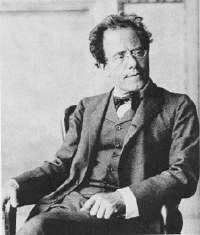
Mozart, Mahler and Stradivari at the RFHThe soloist in the Mozart was Janine Jansen, who played it lyrically and clearly with the tension of a coiled spring. The work has gained the nickname 'Turkish' because of the slightly exotic tone of the final movement - actually based on Hungarian ideas, but people in the eighteenth century had only a vague idea of ethnic music: Ms. Jansen approached the lively middle section with considerable energy. It would have been helpful if the programme note had identified the source of the cadenzas (Mozart left no cadenzas for this work): however, and unusually, it did identify the instrument: a Stradivarius, nicknamed the 'Barrere', made by Antonio Stradivari in 1727, and hence 275 years old - and 48 years older than the concerto. The instrument showed a light and delicate tone, quite bright in the upper register and perhaps very fractionally nasal in quality: perhaps a little too quiet for such a large hall. It's on extended loan to Ms. Jansen from the Elise Mathilde fund, and much better that it should be played than exhibited under a glass case in a museum.  It's
been claimed that listening to Mozart increases one's intelligence, if only
temporarily (the effects must have worn off by now) - perhaps this would enable
one to approach Mahler's pessimistic 6th Symphony with greater
equanimity. Mahler himself described the 'programme' for this work: 'It is the
hero, on whom fall three blows of fate, the last of which fells him as a tree is
felled'. The 'three blows', which appear in the final movement to destroy any
false optimism in the music, are represented by a percussionist striking a
wooden plinth with a huge mallet some four feet long - this sounds absurd when
described in print, but the loud dull thud certainly carries an emotional charge
in the context of the music. The work is long - 79 minutes (making one grateful
for the increased leg-room resulting from the hall's refurbishment) and requires
a very tight control by the conductor to hold it together: Saraste and the huge
orchestra gave an excellent performance, revealing the very detailed and complex
scoring. It's
been claimed that listening to Mozart increases one's intelligence, if only
temporarily (the effects must have worn off by now) - perhaps this would enable
one to approach Mahler's pessimistic 6th Symphony with greater
equanimity. Mahler himself described the 'programme' for this work: 'It is the
hero, on whom fall three blows of fate, the last of which fells him as a tree is
felled'. The 'three blows', which appear in the final movement to destroy any
false optimism in the music, are represented by a percussionist striking a
wooden plinth with a huge mallet some four feet long - this sounds absurd when
described in print, but the loud dull thud certainly carries an emotional charge
in the context of the music. The work is long - 79 minutes (making one grateful
for the increased leg-room resulting from the hall's refurbishment) and requires
a very tight control by the conductor to hold it together: Saraste and the huge
orchestra gave an excellent performance, revealing the very detailed and complex
scoring.Posted: Fri - November 9, 2007 at 09:13 AM by Roger Wilmut |
Quick Links
About Me:
Roger Wilmut XML/RSS Feed
MY PODCAST
Archives
Calendar
Blogroll
WEBRINGS
Statistics
Total entries in this category: Published On: Mar 11, 2016 05:00 PM |
||||||||||||||||||


